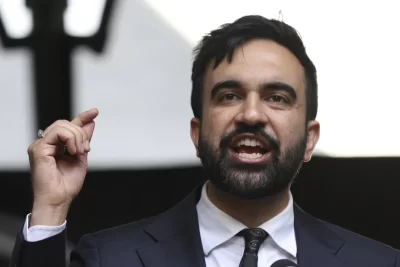
President Emmanuel Macron on Thursday met with local officials in riot-hit New Caledonia, having crossed the globe by plane in a high-profile show of support for the French Pacific archipelago gripped by deadly unrest and where Indigenous people have long sought independence from France.
Macron, who briefly spoke to reporters after his arrival at La Tontouta International Airport, about 50 kilometers (31 miles) from the New Caledonian capital of Noumea, said he viewed a return to calm as the top priority.
He said his wish, along with that of his ministers and government, was “to be alongside the people and see a return to peace, calm and security as soon as possible.”
Macron added that he would discuss the resources needed to repair the damage wrought by days of shootings, arson and other violence that has left at least six dead and destruction estimated to be in the hundreds of millions of euros (dollars).
“We will discuss questions of economic reconstruction, support and rapid response, and the most delicate political questions, as we talk about the future of New Caledonia,” he said. “By the end of the day, decisions will be taken and announcements will be made.”
When asked by a reporter whether he thought a 12-hour visit was enough, Macron responded: “We will see. I don’t have a limit.”
As he opened a meeting with local leaders, Macron held a moment of silence for the people who lost their lives in the unrest before touching on the steps his government plans to take. Officials from both pro-independence and loyalist factions were present, according to a list of attendees provided by the Elysee presidential office.
Macron said 3,000 security officers have been deployed to New Caledonia. They will stay as long as deemed necessary, he said, even if that means remaining there during the summer Olympic and Paralympic Games that Paris and other parts of France will host starting in late July.
While he said he didn’t think the current state of emergency should be extended, he said it would only be lifted if all political leaders called for the barricades and roadblocks to be taken down.
His government was working with local leaders to assess the cost of the damage and was prepared to provide financial aid and insurance assistance, he said.
He added that he hoped an open dialogue would decrease tensions and provide a way forward that respects the outcomes of previous independence referendums that were in favor of staying part of France.
The president had scrapped his previously announced schedule to make the journey of some 16,000 kilometers (10,000 miles) himself, spurred by the most severe violence to hit New Caledonia since the 1980s. The lightning visit, expected to last just one day, will allow him to see the destruction first-hand.
It was late Tuesday in Paris when he climbed aboard his presidential jet but, because of the distance and time difference, it was already Thursday morning in New Caledonia when he arrived, with unrest still simmering and his interior and defense ministers in tow.
The violence erupted May 13 as the French legislature in Paris debated amending the French Constitution to make changes to New Caledonia voter lists. The National Assembly approved a bill that will, among other changes, allow residents who have lived in New Caledonia for at least 10 years to cast ballots in provincial elections.
Opponents fear the measure will benefit pro-France politicians in New Caledonia and further marginalize the Kanaks, who once suffered from strict segregation policies and widespread discrimination.
There have been decades of tensions over the issue of independence between the Kanaks and descendants of colonists and others who settled in the territory of 270,000 people and want to remain part of France.
Macron, in the past, has facilitated dialogue in New Caledonia between pro-independence and pro-France factions. The efforts culminated in a 2018 referendum, the first of three, in which New Caledonians voted to remain part of France by a narrow margin.
At least six people have died in the violence, including four civilians and two gendarmes. The New Caledonia High Commission said more than 280 people have been arrested and 84 police officers and gendarmes have been injured. It was not clear how many civilians were injured.
French Interior Minister Gerald Darmanin, Defense Minister Sebastien Lecornu and Overseas Territories Minister Marie Guevenoux accompanied Macron on the trip.




